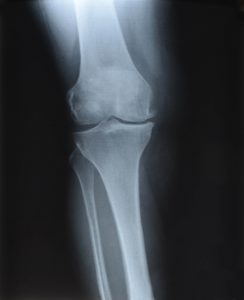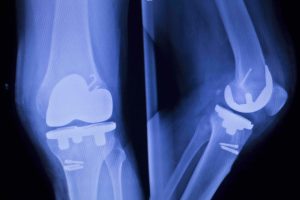Do I need a total knee replacement?
Total knee replacement considerations
 Total knee replacement, or knee arthroplasty, is the complete replacement of surfaces inside of the knee joint. Total knee replacement is often an elective procedure to reduce pain associated with advanced stages of arthritis. The most common arthritis is osteoarthritis, but rheumatoid arthritis and post traumatic arthritis can also be culpable in the degradation of the knee joint. Some conditions such as avascular necrosis, bone death from lack of oxygen, can damage the joint and jump start the breakdown of cartilage. Incidents of avascular necrosis are correlated with high doses of corticosteroids and alcohol consumption. Some patients have had their meniscus removed from previous damage and no longer have any cushioning between the bones; ideally these patients would recieve a meniscus transplant before the knee degrades to the point of needing replacement, but not all patients are canidates. Regardless of the cause the cartilage in the knee does not regenerate on its own and can become damaged over time. As the damage causes pain and inflammation, the body’s response can accelerate the process. Treatment of arthritis involves the slowing of the progression of the disease and managing pain. In the case of the knee, when the joint is so far deteriorated that standing and walking become so painful that you are becoming sedentary a patellofemoral replacement, partial knee replacement, or total knee replacement could be considered to reduce or eliminate the source of pain and get you back to a more mobile lifestyle for roughly ten to thirty years until the prosthetic wears out requiring a revision replacement.
Total knee replacement, or knee arthroplasty, is the complete replacement of surfaces inside of the knee joint. Total knee replacement is often an elective procedure to reduce pain associated with advanced stages of arthritis. The most common arthritis is osteoarthritis, but rheumatoid arthritis and post traumatic arthritis can also be culpable in the degradation of the knee joint. Some conditions such as avascular necrosis, bone death from lack of oxygen, can damage the joint and jump start the breakdown of cartilage. Incidents of avascular necrosis are correlated with high doses of corticosteroids and alcohol consumption. Some patients have had their meniscus removed from previous damage and no longer have any cushioning between the bones; ideally these patients would recieve a meniscus transplant before the knee degrades to the point of needing replacement, but not all patients are canidates. Regardless of the cause the cartilage in the knee does not regenerate on its own and can become damaged over time. As the damage causes pain and inflammation, the body’s response can accelerate the process. Treatment of arthritis involves the slowing of the progression of the disease and managing pain. In the case of the knee, when the joint is so far deteriorated that standing and walking become so painful that you are becoming sedentary a patellofemoral replacement, partial knee replacement, or total knee replacement could be considered to reduce or eliminate the source of pain and get you back to a more mobile lifestyle for roughly ten to thirty years until the prosthetic wears out requiring a revision replacement.
What to expect from a total knee replacement
 A total knee replacement is a surgical option that can be considered after conservative treatments have failed to control your knee pain. Conservative treatments include steroid injections, hyaluronic acid injections, and physical therapy. A total knee replacement, or arthroplasty, is a inpatient procedure with most patients staying in the hospital for two or three days. You will be expected to walk the day of surgery and physical therapists will put you through milestones while you are in the hospital before you are released. Total knee replacement is a recovery intensive procedure that can involve continual motion machines, daily exercises and stretches, and notable pain. Most daily activities can be resumed in as little as six weeks and most patients have recovered by month three to six. Physical therapy may be utilized to balance the leg muscles that support the knee and establish a larger range of motion.
A total knee replacement is a surgical option that can be considered after conservative treatments have failed to control your knee pain. Conservative treatments include steroid injections, hyaluronic acid injections, and physical therapy. A total knee replacement, or arthroplasty, is a inpatient procedure with most patients staying in the hospital for two or three days. You will be expected to walk the day of surgery and physical therapists will put you through milestones while you are in the hospital before you are released. Total knee replacement is a recovery intensive procedure that can involve continual motion machines, daily exercises and stretches, and notable pain. Most daily activities can be resumed in as little as six weeks and most patients have recovered by month three to six. Physical therapy may be utilized to balance the leg muscles that support the knee and establish a larger range of motion.
Additional Considerations for total knee replacement
There are many options when it comes to total knee replacement as far as products and procedures. Surgeons typically have products that they feel are superior to others, but there is variability amongst doctors on how and what is used to perform a total knee replacement. Currently there are custom knee prosthesis that are specifically built for the patient. There are robotic assisted procedures that use GPS like technology to guide the surgeon through each cut to increase angular precision and fit of the prosthetic. Some patients may even be eligible for only a partial knee replacement so they can keep a more natural range of motion that includes twisting of the knee. With all the options available it would be prudent to discuss the options with your provider and make sure you feel comfortable and part of the decision-making process.
Talk to a knee specialist today to see if total joint replacement is right for you! 817-375-5200

